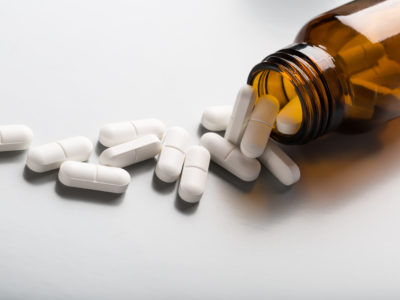Table of Contents[Hide][Show]
Probiotics have been used in medicine for decades, but they are rapidly rising in popularity. From doctors to dieticians to friends who’ve been thrilled with their results, it seems as though everyone is recommending probiotics.
And one group, in particular, can benefit from probiotics: women.
Due to the very nature of probiotics and the symptoms that they overcome, women are highly likely to see unique and lasting results when they begin taking probiotics.
What are the benefits of probiotics for women? Let’s take a closer look at how probiotics work, what issue they can reduce or eliminate, and why women are seeing such wonderful results.
What are probiotics exactly?
Probiotics are living microorganisms that boost the beneficial bacteria in your gut, in both quality and quantity.
Now, you may be thinking… Bacteria? In my gut? Is that a good thing?
The answer is an emphatic yes!
Probiotics and bacteria
First thing’s first: why do we need bacteria to maintain our health?
Your body is home to more than 39 trillion microbes, including bacteria, viruses, and fungi. They live in and on your body, especially on your skin, in your mouth and nose, and in your gut. And contrary to what you may think, you actually want them there.
There are two types of bacteria in your body. The first is beneficial or “good” bacteria. This bacteria boosts your immune system, helps with digestion, regulates your moods, and keeps your body feeling happy and healthy.
The second type of bacteria is pathogenic or “bad” bacteria. This bacteria can cause digestive troubles, skin problems, anxiety and depression, and other symptoms.
Which type of bacteria affects you the most? It depends on the balance between them. Your gut microbiome, which houses both types of bacteria, has limited real estate.
Whichever bacteria is strongest—beneficial or pathogenic—is the one that flourishes. And when one colony is thriving, it takes up more space and consequently “squeezes out” the other.
Ideally, the colonies of good bacteria will be supported and promoted. This would leave little room for bad bacteria to grow. You can expect positive health results.
For most people, however, this isn’t the case. Most of us exist in a state of dysbiosis, where the bad bacteria outnumber the good.
When this occurs, you’ll see the negative impact on your physical, emotional, and mental health.
How do probiotics work?
There are two things you’ll want to do for maximum gut health:
- rebalance your gut microbiome, and
- maintain your gut health.
The way to achieve both of those goals is by promoting the growth of beneficial bacteria, which in turn will allow them to crowd out the pathogenic bacteria.
And the most effective method for getting that result is with probiotics.
Probiotics can be found in food, drinks, or supplements. When you consume them, they help the beneficial bacteria in your body strengthen and multiply. The bad bacteria, without space to thrive, will begin to die off and eventually be eliminated by your body.
With probiotics, you’ll regain your gut health and be able to maintain its proper balance.
Why do women need probiotics?
Because almost all of us are living with imbalanced gut microbiomes, almost all of us can benefit from taking probiotics. For the select few who might not be feeling the symptoms, probiotics will help you maintain the correct bacterial equilibrium.
That said, women, in particular, will benefit from the use of probiotics.
For starters, many of the medical issues caused by an unhealthy gut can disproportionately affect women.
- Women are more likely to suffer from digestive issues.
- Women can experience mood swings due to their menstrual cycles, pregnancy, and menopause.
- Probiotics also support a healthy vaginal microbiome.
Women also report higher stress levels than men, which can negatively affect beneficial bacteria through the gut-brain axis. And, women are 40% more likely to be prescribed antibiotics, the use of which also kills off a high amount of good bacteria and can lead to dysbiosis.
Related
Antibiotics, Their Side Effects, and How to Avoid Them
Learn about antibiotics side effects (from long and short-term use) and what probiotics to take while on antibiotics to help repair the damage they cause to your gut health.
Benefits of Probiotics For Women
So, what are some of the unique ways that women will benefit from taking a probiotic?.
Overcome Digestive Issues
Digestive issues are one of the biggest signs of dysbiosis (for all demographics). However, women are especially likely to suffer from GI issues.
- Women are two to six times more likely to suffer from Irritable Bowel Syndrome (IBS).
- Women are twice as likely to be diagnosed with Inflammatory Bowel Disease (IBD).
With these numbers, it’s clear that resolving digestive issues is one of the biggest benefits of probiotics for women.
Prevent Urinary Tract Infections (UTIs)
Probiotics promote good bacteria and drive out bad bacteria all over your body, not just your gut. This includes the bacteria living in the vaginal microbiome.
And for the whopping 40% to 60% of women suffering from UTIs on a regular basis, probiotics can help eliminate infections and/or reduce symptoms when they occur.
Improve Vaginal Health
Another common infection in women is Bacterial Vaginosis (BV). This is most often caused by an imbalance of the bacteria in the vaginal microbiome.
Studies show that probiotics containing Lactobacillus are effective at curing and preventing BV infections.
Increase Fertility
Can probiotics help women get pregnant? Studies show promising results! The diversity and strength of bacteria found in Lactobacillus strains of probiotics seem to correlate with increased chances of pregnancy.
Lose Weight
During menopause, women tend to gain weight for several reasons, including lower estrogen levels and a slower metabolism. Probiotics can help regulate weight by boosting the production of short-chain fatty acids (which boost metabolism), reducing the absorption of fats, and releasing hormones that signal satiety.
How to Add Probiotics to Your Diet
There are two ways to promote your beneficial bacteria with probiotics: food and supplements.
Probiotic-Rich Foods
There are plenty of foods and drinks that are probiotic-rich. You may even be eating some of them already and not have realized it. And the best part is that these are healthy, all-natural foods that you can find right at your local grocery store!
Some of the more common probiotic foods include:
- Kefir
- Kimchi
- Kombucha
- Miso
- Pickles
- Sauerkraut
- Soft cheeses (only certain ones)
- Sourdough bread
- Tempeh
- Yogurt (check for probiotics on the label)
For the most part, these are fermented foods—the fermentation process produces the bacteria and/or yeast required for probiotics.
However, fermented foods also have a unique taste and smell, which don’t appeal to everyone. If you don’t prefer these foods or are on a restricted diet, you can opt for probiotic supplements instead.
Related
10 Foods To Add To Your Microbiome Diet
Nourish your gut with a healthy microbiome diet. Incorporate these 10 foods into your meals starting today!
Probiotic Supplements
If you choose probiotic supplements, it’s important not just to supplement, but to supplement right. That means choosing a supplement that is effective and produces results.
Here are some things you may want to keep in mind when picking a probiotic supplement.
Survivability
Your supplement will have to survive in a pretty harsh environment before it gets to your gut: through your digestive tracts and its enzymes, bile, and acids. And it needs to “arrive alive” in order to do its job!
This probiotic supplement from Just Thrive is surrounded by a natural endospore shell that protects it on its journey through your digestive tract. Clinical trials prove that it’ll reach your gut microbiome 100% alive and ready to work.
Strain
There are tons of probiotics on the market. Their labels will tell you just what they contain. But what should you look out for?
For women, the most powerful strain of probiotics is the spore Bacillus. These organisms occur naturally in the soil, and Mother Nature herself has gifted them with sturdy richness. Our favorite probiotic from Just Thrive has four separate strains of the Bacillus probiotics, for maximum effectiveness and results.
Final Thoughts
Probiotics are an important element of wellness across all genders, age groups, and ethnicities. But the unique physical, emotional, and mental needs of women put them in a prime position to benefit from probiotics.
Whether you choose to add probiotic-rich foods, supplements, or both, you’ll love the happier, healthier body you’ll get from adding probiotics to your wellness regime!
You May Also Like…






